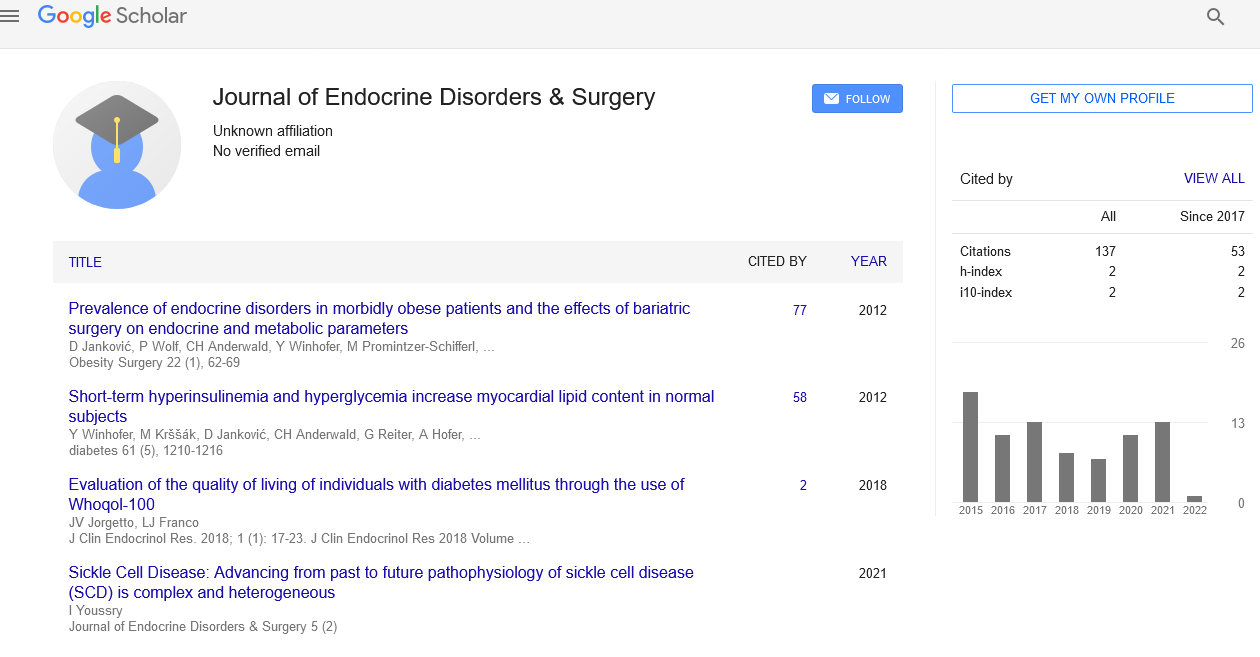Reproductive Endocrinology
Received: 04-Dec-2022, Manuscript No. puljeds-23-6206; Editor assigned: 06-Dec-2022, Pre QC No. puljeds-23-6206 (PQ); Accepted Date: Dec 23, 2022; Reviewed: 10-Dec-2022 QC No. puljeds-23-6206 (Q); Revised: 12-Dec-2022, Manuscript No. puljeds-23-6206 (R); Published: 30-Dec-2022, DOI: 10.37532/puljds.2022.6(6).01-02
Citation: Adams J. Reproductive endocrinology. J. Endocr Disord Surg. 2022;6(6):01-02.
This open-access article is distributed under the terms of the Creative Commons Attribution Non-Commercial License (CC BY-NC) (http://creativecommons.org/licenses/by-nc/4.0/), which permits reuse, distribution and reproduction of the article, provided that the original work is properly cited and the reuse is restricted to noncommercial purposes. For commercial reuse, contact reprints@pulsus.com
Abstract
The female reproductive system is regulated by hormonal interactions between the brain, anterior pituitary gland, and ovaries. GonadotropinReleasing Hormone (GnRH), also referred to as luteinizing hormonereleasing hormone, is a small peptide secreted by the brain. The anterior pituitary glands gonadotropins are specialized cells that secrete the gonadotropins Luteinizing Hormone (LH) and Follicle-Stimulating Hormone (FSH).
https://sporbahisleri.livejournal.com https://wakelet.com/@SporBahisleri67459 https://theomnibuzz.com/author/sporbahisleri/ https://lessons.drawspace.com/profile/322207/sporbahisleri/workflow https://writeupcafe.com/profile/sporbahisleri/ http://www.pearltrees.com/sporbahisleri https://pharmahub.org/members/26874/blog https://www.zupyak.com/u/Spor-Bahisleri/ https://www.metroflog.co/sporbahisleri https://www.fuzia.com/fz/spor-bahisleri https://tr.pinterest.com/sporbahislerim/ https://my.getjealous.com/sporbahisleri https://sporbahisleri.contently.com https://hubpages.com/@sporbahisleri https://www.tumblr.com/sporbahisleri https://hub.docker.com/u/sporbahislerim https://betsiteleri.blogfree.net https://betsiteleri.amebaownd.com https://sporbahisleri.pixnet.net/blog https://betsiteleri.seesaa.net https://betsiteleri.threadless.com https://betsiteleri.neocities.org https://bahissiteleri.localinfo.jp https://betsiteleri.shopinfo.jp https://teletype.in/@betsiteleri https://ubl.xml.org/users/sporbahisleri https://betsiteleri.educatorpages.com https://betsiteleri.onlc.fr https://sporbahisleri.gumroad.com
Keywords
Aldosterone; Hydrocortisone; Adrenaline
Introduction
GnRH controls this process. Every one to four hours, these hormones are produced in brief bursts (called pulses). The reproductive hormones estradiol (an estrogen) and progesterone are secreted from the ovaries more readily when LH and FSH are present. Progesterone and estrogen are almost completely bound to plasma proteins as they travel through the bloodstream. Only the free forms of oestrogen and progesterone seem to have biochemical activity. They stimulate the breasts as well as the reproductive system's target areas (such as the uterus and vagina). They typically inhibit (what is known as negative feedback), but under specific conditions (like right before ovulation), they might promote gonadotropin secretion.
Different variables have an impact on the age at which puberty begins and the rate of development through the various stages. The onset of puberty has decreased over the past 150 years, mainly as a result of better health and nutrition, but this trend has now stabilized. The average age of puberty onset in the US is 12.5 years, but this differs by ethnicity.
Infertility, menopause, and other problems with reproductive hormones are treated by the medical specialization of reproductive endocrinology. Obstetricians and gynecologists (OB/GYN) with additional training in reproductive endocrinology can assist both men and women with issues relating to reproductive hormones.
Any issue or requirement involving feminine hormones can be addressed by a reproductive endocrinologist. These consist of:
Infertility
The doctor will perform tests and ask your questions to determine the possible causes of your infertility. On the basis of the reason, the doctor will then suggest treatments.
Protection of fertility
When you have a condition, are receiving treatment for it, or have an event that will impair your fertility, you can save sperm, eggs, or embryos (fertilized eggs). A person who requires cancer treatment, for instance, might decide to freeze her eggs or embryos before the procedure.
Endometriosis
Endometriosis is when the lining that builds up inside a woman's uterus (womb) begins growing in other areas outside the uterus. Each month, a woman's hormones instruct her body to shed this lining, which she does during her menstruation. As the body attempts to get rid of the lining from both inside and outside the uterus, a woman with endometriosis may experience significant discomfort during her period.
Treatments for fertility issues provided by reproductive endocrinologists include:
In vitro conception is a form of assisted reproduction
Any process in which eggs and embryos (fertilized eggs) are handled outside of a woman's body is considered assisted reproductive technology. In vitro fertilization is the most typical process (IVF). The doctor takes sperm from the woman's spouse or a donor after removing the woman's eggs from her uterus. In a laboratory, the embryos are fertilized outside of a woman's body. The woman's uterus is then filled with a fertilized embryo.
Gynecological operations
In addition to performing surgeries to handle endometriosis, uterine fibroids, blocked fallopian tubes, and other obstacles to pregnancy, reproductive endocrinologists also look for and remove uterine fibroids, which are benign growths in the uterus.
Hormone therapy
Infertility is treated with hormones and assisted reproductive technology, and hormones can also help a woman bring a baby to term. Hormones are also used to address certain causes of infertility, like polycystic ovarian syndrome.
A physician who focuses on the hormone system is known as an endocrinologist. Your body's network of glands produces chemicals that facilitate cell communication. Although the endocrine system is diverse and complicated, aiding in reproduction is one of its key functions. An Obstetrician/Gynecologist (OB/GYN) who specialises in diagnosing and treating endocrine conditions that are either directly or indirectly linked to reproduction is known as a Reproductive Endocrinologist (RE). They primarily address problems with infertility, which is when you are unable to become pregnant after a year of unprotected intercourse. Being a reproductive specialist requires years of training. You must first have a bachelor's degree, typically in a science-related subject.
To enroll in medical school, you must next complete the Medical College Admissions Test (MCAT), just like all other doctors. After that, you'll enroll in and complete a four-year medical school curriculum. The American Board of Obstetrics and Gynecology will certify you as an OB/GYN after you complete a training programme.





